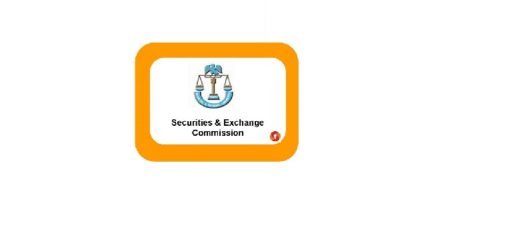POSITION PAPER: The Meeting with Executive Chairman, SEC
Protocol
May we reiterate our congratulations to you on your appointment as the Director-General of the Securities & Exchange Commission (SEC). We believe that your appointment is a sign of the confidence reposed on you to move the Commission to greater heights. This meeting is in furtherance of the interaction between the SEC and the Organized Private Sector (OPS) under the leadership of NECA. It is also to follow-up on some outstanding issues as they affect Members of the Organized Private Sector (OPS)
Outstanding Issues
Filing of Q4 Interim Unaudited Results
Our member Companies have been complying with their legal/regulatory obligation to file interim and annual results/returns with SEC. The only area of dispute/concern is with respect to filing of Q4 interim unaudited results. A number of our member Companies have been served with demand notices directing payment of several hundreds of millions of Naira as penalties for alleged failure to file Quarter 4 interim unaudited results for a number of years with threats of enforcement. The objective of our engagement on this subject matter is to appeal to SEC to reconsider its position with respect to filing of Quarter 4 Interim unaudited results by Companies and for it to withdraw the penalties served on our member Companies, for the following reasons:
- The Applicable Law & Regulations on Filing of Annual & Interim Accounts:
Section 60(1) of Investments & Securities Act, 2007 & Rule 38(1) of SEC Rules states that: “All public companies whose securities are required to be registered shall file with the Commission on a periodic or annual basis and on a specified format its audited financial statement and other returns as may be prescribed by the Commission from time to time”. SEC Rule 39(2) then provides that the Audited Results shall be filed with the Commission not later than ninety (90) days after the financial year end in line with the provisions of CAMA.
SEC Rule 41(1) provides that “Public quoted companies shall not later than thirty (30) days from the end of each quarter file with the Commission and SIMULTANEOUSLY (emphasis supplied) with the relevant Securities Exchanges and the investing public a quarterly report prepared in accordance with the International Financial Reporting Standard (IFRS).” It is apparent from what will be said hereafter that this simultaneous filing of Q4 interim results with SEC and NSE is not feasible.
- NSE Rules on Filing of Quarterly Financial Statements:
Rule 19.6 states that “An Issuer shall announce the financial statements for each of the FIRST THREE QUARTERS of its financial year immediately after the figures are available, but in any event not more than 30 days after the relevant financial period”. This rule clearly shows that NSE does not require public listed companies to file Q4 interim unaudited results.
Rule 30.2 states that “Going to press or otherwise allowing a leak in financial results without informing The Exchange shall attract a suspension from trading and a fine equivalent to 50% of the annual listing fees”. This rule clearly shows that filing of Q4 unaudited results with any other body and or disclosure of same to the investing public without informing the NSE will attract sanction/penalty from NSE.
- NASB (FRC) Standard:
STATEMENT OF ACCOUNTING STANDARD ON INTERIM FINANCIAL REPORTING SAS 30 issued by the Nigerian Accounting Standards Board (the predecessor of Financial Reporting Council) states in its second paragraph as follows: “INTERIM financial Reports are accounting information covering the operations of an organization for a period less than a full financial year, developed at various points during the year. Such reports usually cover a period of three, six or nine months”
The compelling proposition/submission from the foregoing is that SEC should align with the unambiguous, practical, realistic, and best practice position as lucidly expressed in the NSE & FRC Rules/Standards that filing of Q4 Results is not required. This will bring clarity and certainty to the matter. This is more so when the Amendments to the NSE Listing Rules (excluding filing of Q4 unaudited results) were approved by SEC on 19th May, 2014.
Practical Reality: Filing of Q4 Interim Vis-À-Vis Year End Audited Results
- From the Rules of SEC rehashed above, interim unaudited results are to be filed within 30 days of a quarter ends; while year-end audited accounts are to be filed within 90 days of year end. In the case of filing of Q4 interim unaudited results, and audited year-end results for a company with 31 December year-end, there is just a gap of 60 days (between 31 January for unaudited Q4 results and 31 March for audited results). As we all know, interim results are unaudited and are subject to audit adjustments for accuracy and reliability. Unaudited Q4 Interim Results which when cumulated with the earlier submitted Q1, Q2 and Q3 Interim results should reflect a company’s performance for a year, would create a practical problem. This is especially so when the audited results usually end up being different from the interim unaudited results as a result of audit adjustments. Having two sets of results, one unaudited and the other audited in circulation at the same time will have confusing and misleading effects on investors and the investing public, with serious adverse effect on the integrity of the company and the capital market.
- The view that Q4 interim unaudited results should be filed by 31 January by companies with 31 December year-end in order not to deprive the investing public of information from 1 November (when the last Q3 unaudited results were last filed) to 31 March (when the audited results are expected to be filed) is not supported by recent developments for the following reasons:
- The 90 days specified for filing audited results is the latest date for the accounts to be filed and NOT the earliest date.
- Although companies are required to file their audited results within 90 days, nowadays, a lot of companies file their results less than 45 days after year-end and this can be confirmed from the NSE Issuers Portal. Therefore, companies with 31 December year-end which are required to file their audited results by 31 March 2016 actually filed their audited results by the second week in February 2016 (just few days after SEC requires them to file Q4 unaudited results i.e. 31 January). For example, Nigerian Breweries Plc filed its 2015 audited results with the NSE on 10 February 2016. Therefore, if audited results which the investing public would rely upon are available just few days after companies are required to file the unaudited Q4 results (which are subject to audit adjustments), there is no reason to insist that the Q4 unaudited results should be filed as the investors are actually given very reliable information within reasonable time.
- To confirm the current trend of early filing of audited results, several PLCs held their AGMs to approve 2015 audited accounts, such as GTB and WAPIC on 5 April 2016; Zenith Bank on 6 April; UBA on 8 April 2016; African Prudential Plc on 12 April 2016, etc. The above facts further confirm that the audited results of these companies were filed early February 2016 for them to hold AGMs in April. This is in view of the fact that based on statutory timelines, AGMs of listed PLCs can only be held after 40 days of filing the results with regulatory authorities.
Implications of Filing Q4 Unaudited Results with only SEC
- SEC has always requested that price sensitive information must be disclosed to all stakeholders simultaneously in order to prevent market abuse. There is no doubt that Q4 audited results are price sensitive information. In view of the fact that Q4 unaudited results are not required to be filed with NSE, they cannot be published by PLCs. Consequently, such sensitive information coming ahead of the year-end audited results would only be available to SEC, and there is the need to avoid any possibility of misuse of the sensitive information.
- Compromise of the Integrity of Quiet and Close Periods: To protect the integrity of the market, insiders of companies are not allowed to talk about or deal in the securities of their companies until after the release of price sensitive information simultaneously to the public. However, if companies are now compelled by SEC to file their Q4 unaudited results 30 days after year-end, then, that would be the end of quiet and closed periods for insiders as they would rely on the release of the information to SEC (although not available to the public) to talk about and deal in the securities of their companies for their personal benefits ahead of the release of the audited results to the public. The adverse implications of the above on the capital market are better imagined, and should be avoided.
Earning forecast:
SEC is further urged to reconsider its position on filing of Q4 interim results as filing of earning forecast which the interim unaudited results would have been required to validate is no longer mandatory.
Experience from other jurisdictions:
We checked the requirements in other developed countries like USA where Q4 reports are not required to be filed, and quarterly reports are only to be filed for the first three quarters. Q4 results are not mandatory in UK, South Africa, Australia and India. Therefore, we can assert that filing of Q4 unaudited results is not an international best practice.
Sequence of filing accounts:
Globally, companies are required to prepare and file 3 months, half year, 9 months (¾) and then full year results. It is not the practice that after filing the 9 months results (¾), the next accounts to be prepared is one quarter (¼). The normal progression of preparing and filing accounts by companies adopted by other regulators like Financial Reporting Council and NSE, which we urge SEC to adopt is ¼, ½, ¾ and 1 and NOT ¼, ½, ¾ and ¼, which is the implication of the SEC demand for filing of Q4 unaudited results by companies.
It should be noted that at the year-end, the results that the investing public and regulators are expecting from companies are the audited results and NOT unaudited results which are subject to amendments.
Our prayers:
In the light of the above, we wish to appeal to SEC to review its rules and position on filing of Q4 interim results; and withdraw the penalties being imposed on a number of Companies for default. We are all aware that companies are currently operating under very difficult circumstances and are consequently being compelled to implement a number of very tough and unpalatable survival measures. We wish to appeal to SEC not to aggravate the already bad situation through imposition of penalties running into hundreds of millions of Naira.
Institutionalized regular meeting
SEC is a regulator in this environment, whose roles and responsibilities are very important. Equally of importance are the other actors, whose views should be considered and carried along for an harmonious working relationship. We wish to recommend the example of PenCom in relating with the Organised Businesses in Nigeria. Though, the laws and rules are in place, however, platforms for engagement play vital roles in compliances with these laws and rules.
In this regard, SEC should actively engage the OPS through NECA before issuing final version of Regulations/Guidelines, etc. Engaging the private sector does not rob the Commission of its powers; rather it builds confidence in the Business Community and ensures compliance by Corporate Nigeria. It also serves as a channel of communication to obtain feedback and promote trust and confidence between the parties.
Conclusion
We appreciate the audience granted us and look forward to a positive resolution of the issues tabled before SEC.
Thank you






Recent Comments